The Ministry of Education said today that it is still revising guidelines for phone use in schools and collecting feedback, although new regulations were originally expected to take effect this month.
Current regulations are mainly based off the 2019 Guidelines for Mobile Device Use in School Campuses of Senior High and Below (高級中等以下學校校園行動載具使用原則).
Schools are required to convene teachers, parents and students to jointly set regulations, but the general principle is that phones should remain off during school hours, except for teacher-guided learning and emergency use.

Photo: Taipei Times
The Legislative Yuan held a public hearing in October last year to discuss how to prevent students from using phones in class, which affects their concentration and learning.
The ministry said it would amend the 2019 regulations in accordance with the legislature’s resolution and announced new draft guidelines for bringing phones to school in May.
These new draft guidelines are titled Guidelines for the Management of Students Bringing Mobile Devices to School Campuses of Senior High and Below (高級中等以下學校學生攜帶行動載具到校管理原則).
In elementary and junior-high schools, mobile phones would be stored in a central location by the school or individual classes, with the details subject to school board approval, the draft guidelines state.
In senior-high schools, teachers, parents and students would jointly discuss how to manage mobile phones, but each school must adopt a unified approach across all classes, they say.
After students protested the new regulations, the ministry held a public hearing in June inviting student groups and representatives to discuss the guidelines.
The ministry said today that it is still collecting opinions from all sides and would continue to carefully draft the new guidelines.
Until the new guidelines are announced, schools should continue to follow current regulations, it said.

A 72-year-old man in Kaohsiung was sentenced to 40 days in jail after he was found having sex with a 67-year-old woman under a slide in a public park on Sunday afternoon. At 3pm on Sunday, a mother surnamed Liang (梁) was with her child at a neighborhood park when they found the man, surnamed Tsai (蔡), and woman, surnamed Huang (黃), underneath the slide. Liang took her child away from the scene, took photographs of the two and called the police, who arrived and arrested the couple. During questioning, Tsai told police that he had met Huang that day and offered to

LOOKING NORTH: The base would enhance the military’s awareness of activities in the Bashi Channel, which China Coast Guard ships have been frequenting, an expert said The Philippine Navy on Thursday last week inaugurated a forward operating base in the country’s northern most province of Batanes, which at 185km from Taiwan would be strategically important in a military conflict in the Taiwan Strait. The Philippine Daily Inquirer quoted Northern Luzon Command Commander Lieutenant General Fernyl Buca as saying that the base in Mahatao would bolster the country’s northern defenses and response capabilities. The base is also a response to the “irregular presence this month of armed” of China Coast Guard vessels frequenting the Bashi Channel in the Luzon Strait just south of Taiwan, the paper reported, citing a

A total lunar eclipse, an astronomical event often referred to as a “blood moon,” would be visible to sky watchers in Taiwan starting just before midnight on Sunday night, the Taipei Astronomical Museum said. The phenomenon is also called “blood moon” due to the reddish-orange hue it takes on as the Earth passes directly between the sun and the moon, completely blocking direct sunlight from reaching the lunar surface. The only light is refracted by the Earth’s atmosphere, and its red wavelengths are bent toward the moon, illuminating it in a dramatic crimson light. Describing the event as the most important astronomical phenomenon

BETTER SERVICE QUALITY: From Nov. 10, tickets with reserved seats would only be valid for the date, train and route specified on the ticket, THSRC said Starting on Nov. 10, high-speed rail passengers with reserved seats would be required to exchange their tickets to board an earlier train. Passengers with reserved seats on a specific train are currently allowed to board earlier trains on the same day and sit in non-reserved cars, but as this is happening increasingly often, and affecting quality of travel and ticket sales, Taiwan High-Speed Rail Corp (THSRC) announced that it would be canceling the policy on Nov. 10. It is one of several new measures launched by THSRC chairman Shih Che (史哲) to improve the quality of service, it said. The company also said